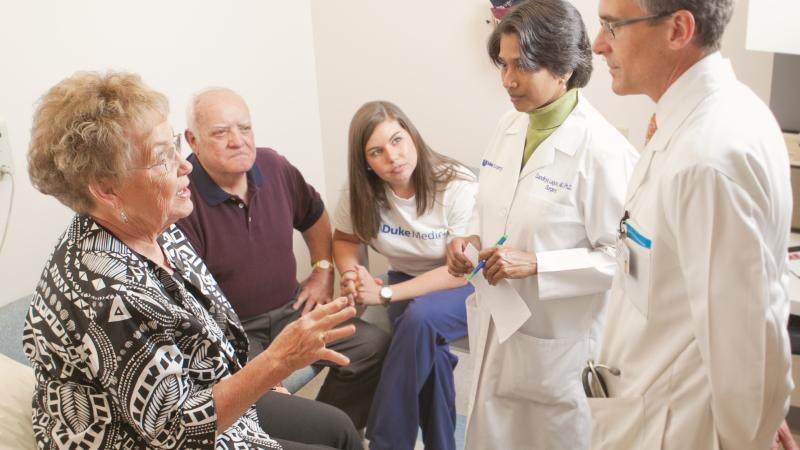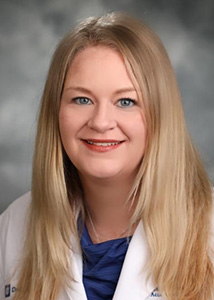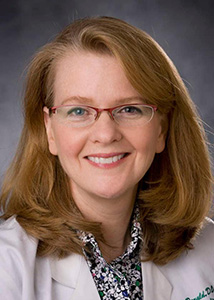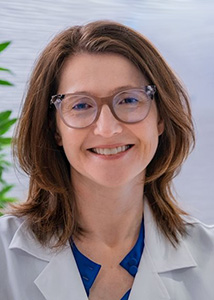
Recognizing the Value of Individualized, Perioperative Care
Optimizing Patient Outcomes
While surgical care may culminate in the operating room, Duke surgeon–scientists recognize that factors contributing to successful patient outcomes extend beyond this singular step of our patients' health care journeys.
By gaining a better understanding of the impacts of perioperative variables like nutrition, patient support systems, and access to interdisciplinary care, our surgeons can deliver tailored, individualized plans that better prepare our patients for surgery and recovery.
The more we learn about our patients, and the unique variations between them, the better equipped we are to deliver personalized care that substantially improves overall outcomes.
Improving Nutrition • Aligning to Patient Needs • Increasing Access to Preventative Care • Looking Beyond the Scalpel
Improving Nutrition
Undergoing a surgical procedure can be incredibly taxing on the body. Because of this, perioperative care that helps patients both recover from and prepare for surgery is essential to reaching optimal outcomes. Various factors play into surgical care, but one vital, often overlooked factor is under the scrutiny of Krista Haines, DO, Assistant Professor of Surgery in the Division of Acute, Trauma, and Critical Care Surgery: nutrition.
“We have a lot of data that shows that if you give people oral nutrition supplements, even just for 10 days before their procedure, they do better [post-operation].”
- Krista Haines, DO
In a national, multi-center study that focused on patients recovering from hip fractures, Dr. Haines and team found that when these patients were given protein shakes during their time in the hospital, their length of stay was meaningfully reduced.

Assistant Professor of Surgery, Division of Acute, Trauma, and Critical Care Surgery
Similarly, a recent pilot study that expanded nutritional support beyond the hospital stay, by providing patients with a month’s supply of protein shakes to take home, has also proven impactful, as post-operation medications can often dampen hunger and appetite, making it difficult for the patient to take in appropriate nutrition otherwise.
Along with ensuring that patients get optimal nutrients post-operatively and after leaving the hospital, Dr. Haines is demonstrating that the patient’s recovery is also influenced by how they are supported before their surgical procedure.
“We have a lot of data that shows that if you give people oral nutrition supplements, even just for 10 days before their procedure, they do better,” explains Dr. Haines. “In many cases, even one-year mortality rates are better, so trying to optimize patients before surgery is a focus.”
With these findings, Dr. Haines is collaborating with multidisciplinary teams to develop nutritional plans for trauma and acute care surgical patients and working to expand this care approach to other service lines as well, such as for breast cancer patients.
Breast cancer patients often lose a significant amount of weight while receiving chemotherapy ahead of the surgical portion of their treatment. To counter this, Dr. Haines and her collaborators on the breast reconstruction team are hoping to provide personalized nutritional supplementation for these patients at the start of their treatment journey, so that they are better positioned for their surgeries and recovery.
Aligning to Patient Needs
While nutrition is a vital perioperative factor that influences a patient’s surgical success, Duke initiatives, such as the Perioperative Optimization of Senior Health (POSH) program, that implement it as part of a broader personalized regimen are further expanding the scope of impactful surgical care.
"It’s really important in an older individual to make sure we understand what their goals are; not only their goals for the surgery, but their goals in life."
- Sandhya Lagoo-Deenadayalan, MD, PhD
As a multidisciplinary and inter-professional collaboration within the Duke Center for Geriatric Surgery, the POSH program continues to address geriatric-specific issues that are critical in the perioperative period. Utilizing systematic protocols and active engagement with geriatric patients and their families, the POSH team assesses for risk factors and outcome goals to develop care plans that are better tailored to the patient’s specific needs.

Professor of Surgery, Division of Minimally Invasive Surgery
“The POSH team is involved during the entire arc of perioperative care, not just one part of it,” explains Sandhya Lagoo-Deenadayalan, MD, PhD, Co-Director of POSH and Professor of Surgery in the Division of Minimally Invasive Surgery.
“For example, it’s really important in an older individual to make sure we understand what their goals are; not only their goals for the surgery, but their goals in life," Dr. Lagoo-Deenadayalan continues. "Usually, we find that they are interested in continuing to be very active and involved with their families and friends, so making sure that the treatment we offer them is in alignment with those goals is critical.”
“We pay attention to critical domains such as cognition, function, nutrition, and psychosocial supports and needs, so it’s a very dynamic and personalized model,” adds Shelley McDonald, DO, PhD, Co-Director of POSH and Associate Professor of Medicine in the Division of Geriatrics.
It is this comprehensive approach to geriatric surgical care that has enabled Duke to participate in the American College of Surgeons Geriatric Surgery Verification program, under which Dr. Lagoo and the team at the Durham VA recently received formal certification. But the POSH approach seems to be influencing more than just patient outcomes.
"Now it’s the standard of geriatric surgical care. And our residents are using the skills they've developed with all their patients, regardless of age, so it is, indeed, a rising tide that lifts all ships.”
- Sandhya Lagoo-Deenadayalan, MD, PhD

Associate Professor of Medicine, Division of Geriatrics
“We've seen a culture change over the last 14 years,” notes Dr. McDonald. “Previously, we never saw in a surgeon’s note—or very rarely—any documentation of a patient’s support system, how they were being cared for, their regular daily activities, whether or not they used mobility aids, or if they were caregivers for anyone."
“Now, even at the intern and resident level, it's becoming something that is very much included within their usual questioning of the patients and in what they discuss with the patients,” adds Dr. Lagoo-Deenadayalan. “Now it’s the standard of geriatric surgical care. And our residents are using the skills they've developed with all their patients, regardless of age, so it is, indeed, a rising tide that lifts all ships.”
Increasing Access to Preventative Care
From the most urgent patients to the eldest, Duke Surgery is recognizing the necessity of addressing factors beyond the hospital walls and their impacts on surgical outcomes.
Taking this philosophy one step further is Samantha Minc, MD, MPH, Instructor in the Division of Vascular and Endovascular Surgery, who hopes to prevent the need for extensive surgical treatment at all, by improving access to preventative vascular care.

Instructor, Division of Vascular and Endovascular Surgery
“Amputation is a devastating but preventable complication of diabetes and peripheral artery disease,” explains Dr. Minc, noting that nearly 85% of these amputations are preceded by a foot ulcer, which, in many cases, can be healed with access to early, high-quality, podiatric and vascular care. However, when that care is not accessible or available to a community, amputations are often the only option by the time some patients make it into their nearest urgent care system.
Consequently, amputation rates are a marker for health disparities and inequitable access to care.
“There’s evidence of geographic ‘hotspots’ of amputation across the country, often related to socioeconomic status, race, and ethnicity,” says Dr. Minc. “But even when controlling for socioeconomic and clinical factors, studies have shown these communities are still getting amputations at higher rates. So there’s something we’re not measuring, something happening at the community level that's impacting how people are able to access care or the quality of care that they are receiving.”
"When serving communities that are disproportionately impacted by inequities related to the social drivers of health, we can’t presume to know what our patients are dealing with. We need to ask them and work with them.”
- Samantha Minc, MD, MPH
Utilizing mixed methods and community engagement research, Dr. Minc is identifying these community-level factors and developing effective interdisciplinary clinical care solutions and community partnerships to resolve them. Most recently, this includes the establishment of the Threatened Limb Clinic at Duke Regional Hospital.
The limb preservation clinic currently includes specialists in podiatry, wound care, and vascular care, but Dr. Minc hopes to expand it over time to include additional expertise in endocrinology, infectious disease, community health, and culinary medicine.
“Ideally, this will be a clinic with a specific sensitivity to the needs of our patient population. A clinic where we have a rich volume of patients coming in and we provide coordinated, quality care that makes sense to them, that caters to and advocates for their specific needs,” says Dr. Minc.

“When serving communities that are disproportionately impacted by inequities related to the social drivers of health, we can’t presume to know what our patients are dealing with. We need to ask them and work with them.”
By actively engaging with the patient communities and implementing solutions that tailor care to their specific needs, we open doors to impactful, preventative care that saves limbs from loss and substantially improves outcomes.
Looking Beyond the Scalpel
Surgery has long been a field of taking proactive steps to mitigate, fix, or eliminate problems of disease and pain. But Duke Surgery is advancing the field through a novel and expanding lens, by addressing factors beyond the hospital walls.
From individualized nutritional support to custom, to interdisciplinary care plans that match the patient’s clinical and personal goals, to culture shifts in clinical approach and community-driven solutions in accessing preventative care, Duke surgeons are redefining surgical care at every level.
The role of the surgeon is evolving, and effectively supporting patients is no longer contained to the operating room. Patients are complex, and dedication to addressing factors beyond their most immediate clinical issues is key to their success. Through proactive engagement and tailored care, Duke Surgery advances surgical care to a new era of optimizing patient outcomes.